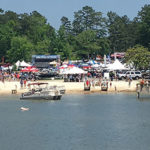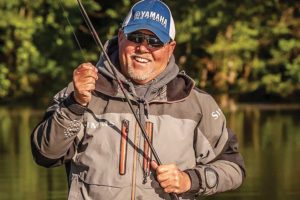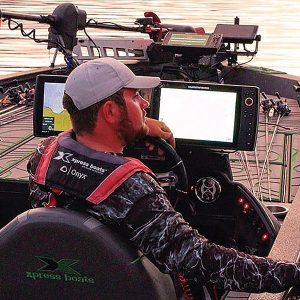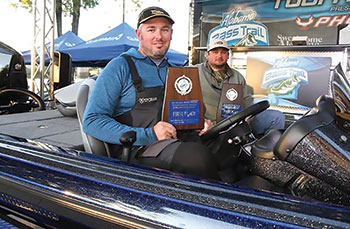
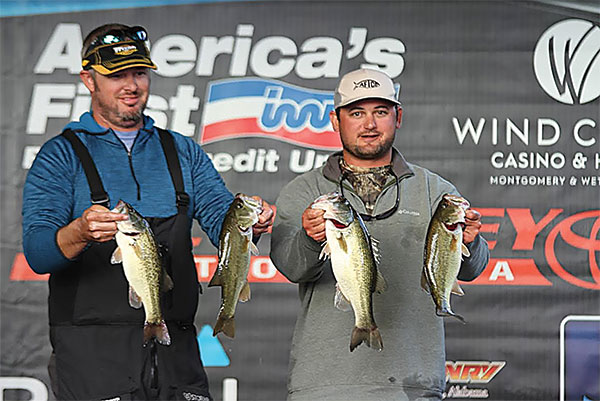
Bain, Colley set to defend the Alabama Bass Trail Series title
Story by Paul South
Submitted photos
When it comes to fishing, Adam Bain and Kris Colley hold to a simple truth, the same flame that burned bright in classic literature and on classic TV.
Whether it’s Melville’s Ishmael, or Mayberry’s Andy and Opie Taylor, it’s not about victory over another angler. It’s man vs. fish.
“It’s kind of like a little puzzle. You have to figure out what the fish are doing and the time of the year, the depth they’re in and what they’re biting,” Bain says. “It’s just you and the fish. It’s not necessarily you against everybody else, it’s you against the fish. There’s as much competition there, as there is to figuring out if you can beat everybody else. You gotta beat the fish.”
Bain from Pell City and Colley of Ashville beat the fish and everybody else in 2018, capturing the Alabama Bass Trail Championship in their home county on Neely Henry Lake.
They’ve won twice on the ABT circuit over the years, once at Pickwick Lake on the Tennessee River, and the ABT title on Neely Henry last year. The pair finished second in 2017, narrowly missing the ABT title on Logan Martin, their day’s catch losing by slightly more than two pounds.

Sanctioned by the Bass Anglers Sportsman Society, the Alabama Bass Trail Tournament Series features two divisions. Each division –North and South – includes five tournaments on five different lakes. As many as 225 two-man boats can compete in each tournament.
Bain, a Realtor and Colley, who works in the railway industry, have made waves on the ABT circuit with their winning ways that combine old-school fishing techniques with high technology in the ever-evolving world of competitive angling.
While the ABT is considered an amateur circuit, each tournament champion wins a $10,000 grand prize, with $47,000 in prizes going to the top 40 teams. In recognition of Alabama’s Bicentennial in 2019, the 200th-place finisher will earn a $200 bonus. The total prize money for the 2019 ABT Series circuit is $568,000.
But for Colley and Bain, it’s not about the money. While they’ve knocked around the idea of moving to a higher level of competitive fishing, family comes first.
“There’s so much money at the local level now that you can stay around the house and win. But we don’t necessarily do it for the money, but for the competition. The money is an added bonus. The more money, the more competition.”
Colley agrees. The rush of the tug on a line is enough.
“We’re both competitive in that we always want to win. It’s not that we fish against each other, but we joke around and make fun of it. You know, fishing is fun. Between the both of us, we never take it to the point where it’s so serious that we take the fun out of it. Honestly, if it ever got to that point, I’d probably quit.”
That fun and love of fishing has helped hook a strong friendship. The two have fished together for about a decade. And their fishing style, forged since childhood on the stained Army-khaki waters of Weiss Lake, Logan Martin and Neely Henry complements each other.
“He’s probably a little more patient than I am. I like to throw stuff and wind it in, Bain says of his angling teammate. “I use a spinner bait or a crank bait. He will take a jig or a piece of plastic and flip it. He thinks that if I’m up there and catching fish that are active, he can fish maybe a different part of the water column.”
While most fishermen would probably never admit it, especially in the age of high-technology depth finders and trolling motors linked to smartphones and sonar-laced lures, luck takes a hand.
But when Colley is on his game, Bain has a simple strategy.
“When he’s on and when he’s getting bites and catching fish, I just stay out of his way. He’s kind of the same way with me. It may be his day a little more often than it is mine. He really does catch a lot of fish.”
Asked his own strengths on the team, Bain quips: “I run the dip net really well.”
While Colley can flip plastic lures into the tall grasses near the shoreline or under docks, Bain is the deep-water specialist, hooking big catches on spinner and crank baits. In the summertime, he generally does well because he catches them deep,” Colley says.
He adds, “We both kind of fish fast, but we do it different ways. When you have that and have two ways of looking at it, if one way’s not working, we’re really quick to switch to another. At the end of the day, you might fish the same, but it’s somewhat different.”
Like most kids who grow up near the lake, fishing has always been a simple pursuit. Joy can be had with a cane pole, a box of worms or a cage of crickets. But as with the rest of the world, technology snagged competitive fishing in its net.
The days of paper topographic maps of bodies of water are no more. Water temperature, depth, barometric pressure, the phases of the moon, all figure into fishing. And the new depth finders make learning an unfamiliar lake easier,
“They call it video game fishing,” Bain says. “As you’re trolling around, and you see a fish directly below you on your depth finder, you can drop a little worm straight down and watch the fish bite on the monitor. There are people who fish like that a lot. We’ve never gotten into that. Because we’re from and fish predominately on the Coosa River, which is shallow, the water stays kind of stained and the fish, most of the year live shallower than in other river systems. So, to fish competitively, you don’t necessarily have to fish out deep the majority of the year. Obviously, there are times you have to go out (deep) to win, even on Logan Martin and Neely Henry, but not as often (on those lakes) as some of the others.”
Colley is excited by the new technology.
“I think it’s great. It’s changed fishing. It’s sort of created a wide range of how to catch fish. You see people who fish on the bank and still win, and then you see people who grew up in the age of technology, and they know how to use it to their advantage, and they’re able to catch them offshore.
It’s changed the way that everybody fishes because at some point in time – we’re not the best in electronics – you’ve got to be able to read them to be competitive. Some of the lengths we go to, you have to know how to read them, or you’re going to get beat.”
Fishing, it seems, is booming. Bain, who learned angling from his father and grandfather, remembers fishing junior tournaments with only three competitive boats. Now fishing flourishes at the prep, amateur, collegiate and pro level. More than 200 boats compete on the ABT circuit, and some of the pros show up at those events. And amateurs compete in some of the professional “open” tourneys.
Bain believes the internet, technology advertising, money and media coverage have boosted the popularity of a sport that once seemed to be gasping for air on the rocks. And as a result, the competition is tough
“The fishermen have gotten good. Your average fisherman is a lot better now than he used to be. Whether that’s the depth finders or the material that’s he’s able to get to and read about and see the new techniques and all this stuff, the average fisherman has gotten much better than he was 20 years ago. It’s got to be the technology that’s doing that.”
Defending champs
Technology aside, Colley and Bain are philosophical as they begin the defense of their 2018 Alabama Bass Trail Series. Colley doesn’t see a bullseye on their backs as the new season began.
“It’s not. We look forward to being able to defend. We’re not going to change anything up. If we go out and do the best we can and if it’s meant to be, it’s meant to be.”
He adds, “We both have our strengths as far as what we like to do and how we do it. If it’s a bait or a certain thing he likes to do, he runs the boat. It just depends on crank or jerk bait like Adam does, or flipping a bait, that’s more my kind of deal. We try to keep each other up. You’re going to lose a big fish here and there, and when we do, we just try to make fun of it. We don’t really get down, we just make fun of and nag each other the rest of the day.”
Asked if the fishing friends are like an old married couple, Colley chuckles.
“Pretty much,” he says.
The pair calls the ABT championship their biggest thrill and their biggest victory in fishing. But even in these days of tournaments and tough competition, where anglers on the ABT try to land five fat keepers, the story always circles back to childhood and the thrill of that first big fish, fun and friendship
“We don’t do a whole lot different than anybody else,” Bain says. “Kris is an outstanding fisherman. I’m probably very lucky to be fishing with him. We’ve taken our lumps over the years, but we’ve put a lot of time in and worked really hard at it. We’ve paid our dues.
“Now that we do have families we aren’t able to fish all the time during the week, like we did growing up. But what success we have now, I can attribute to those days as a kid, fishing for hours, not knowing what you were doing, but just learning. Eventually, years down the road, that stuff does pay off.”















